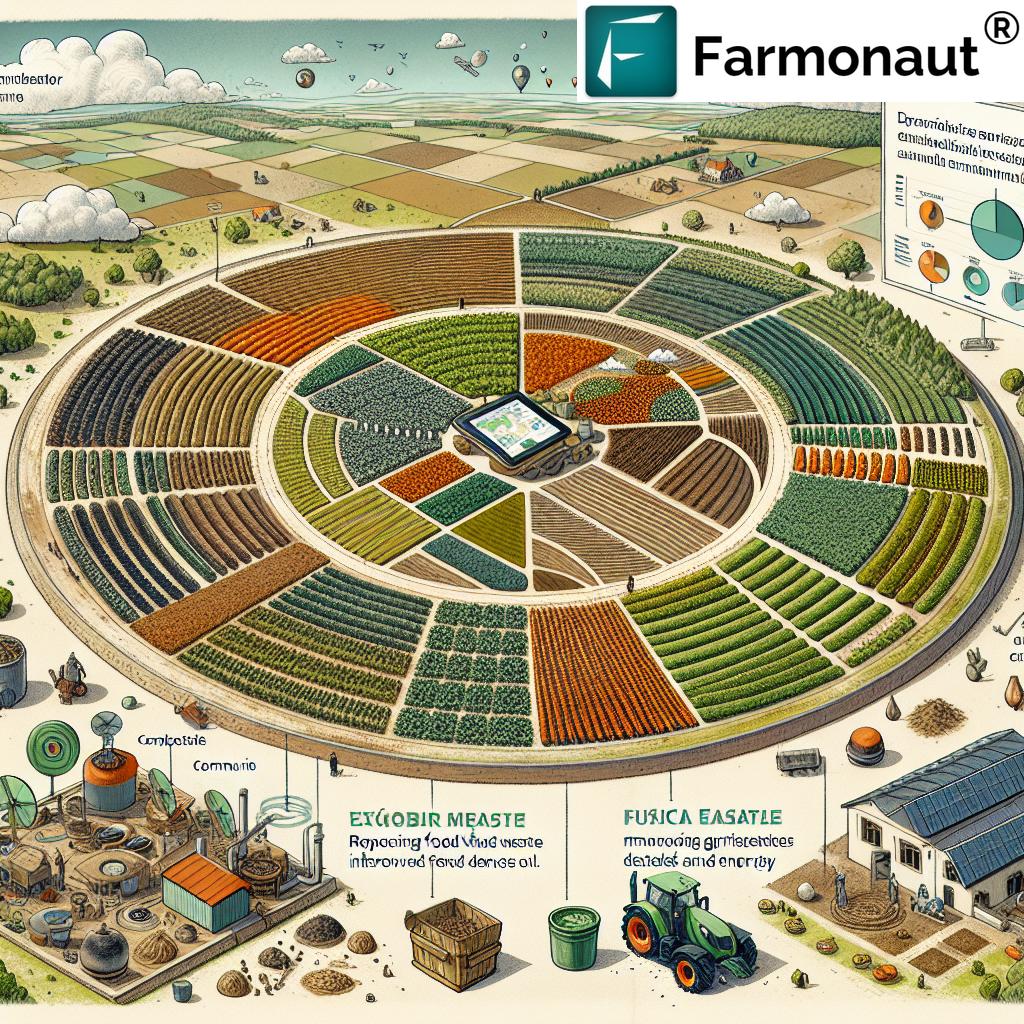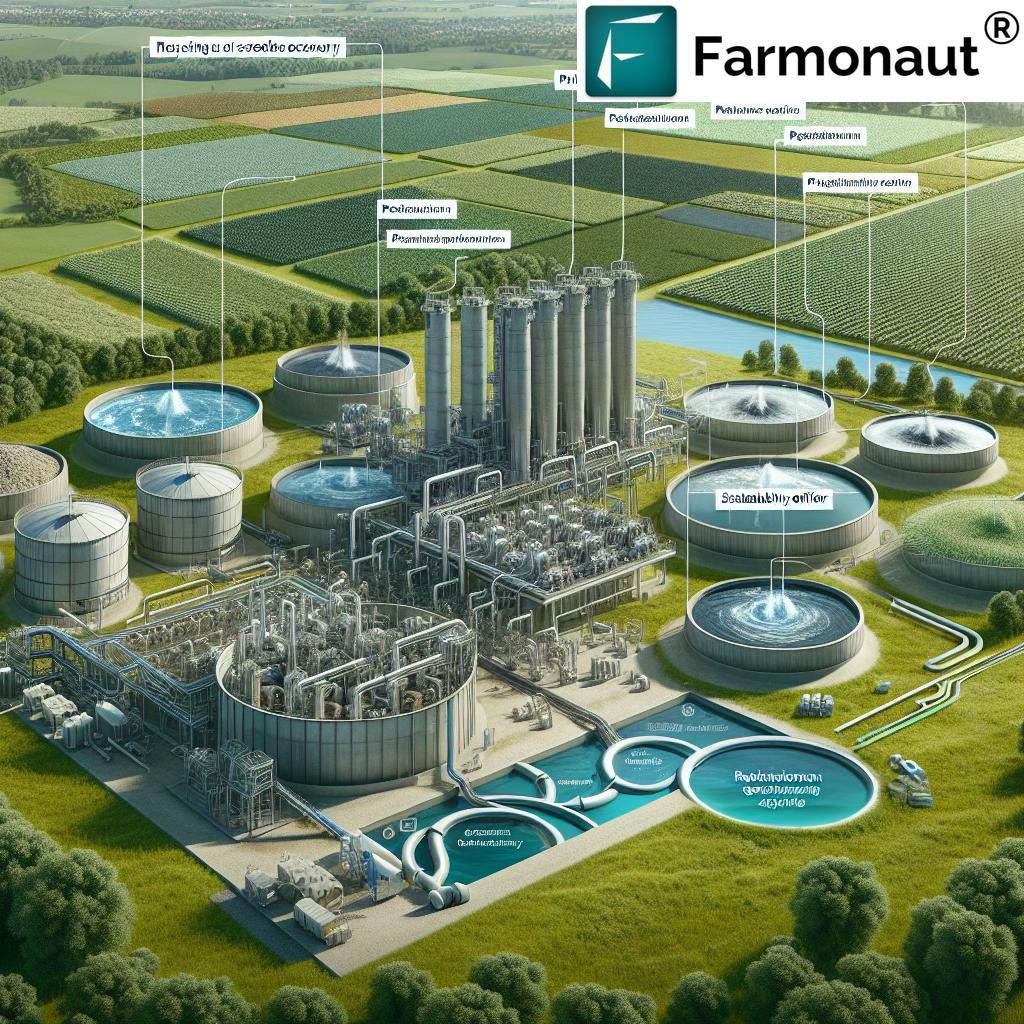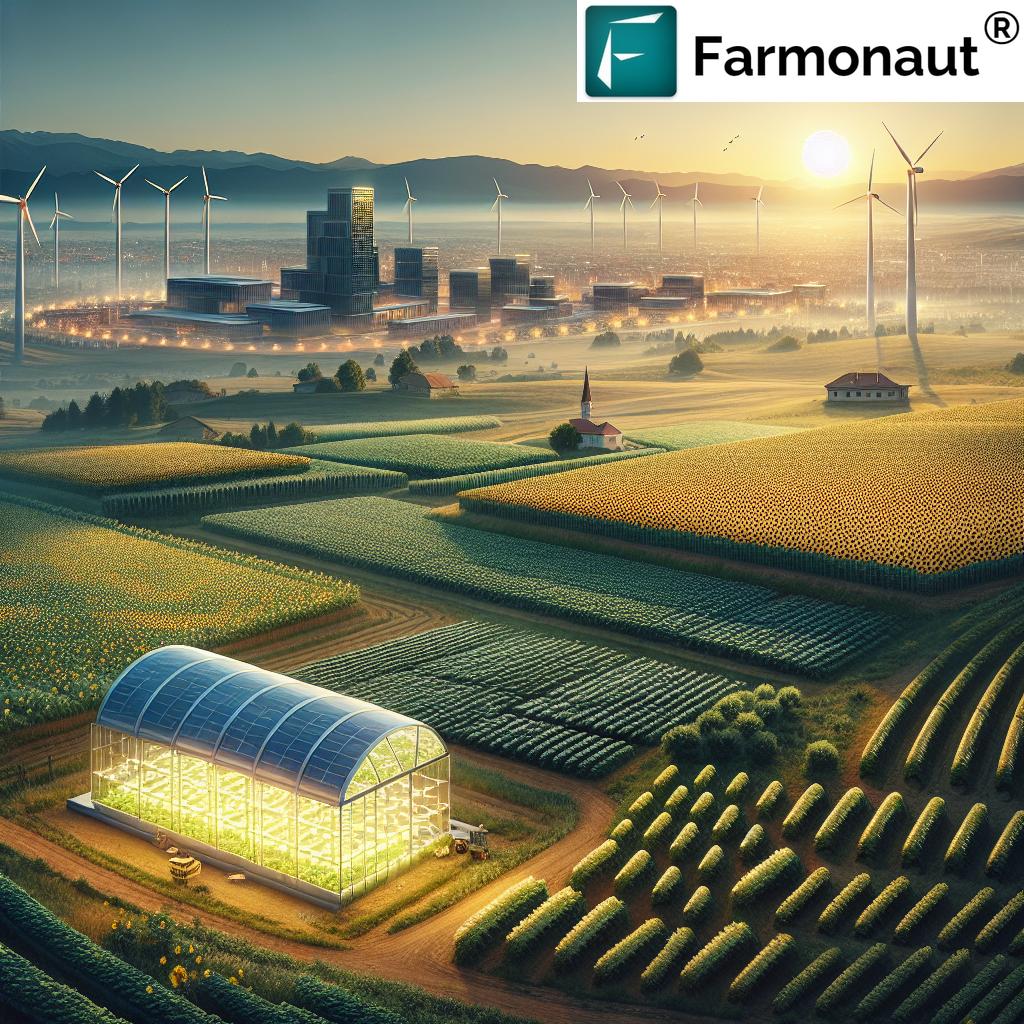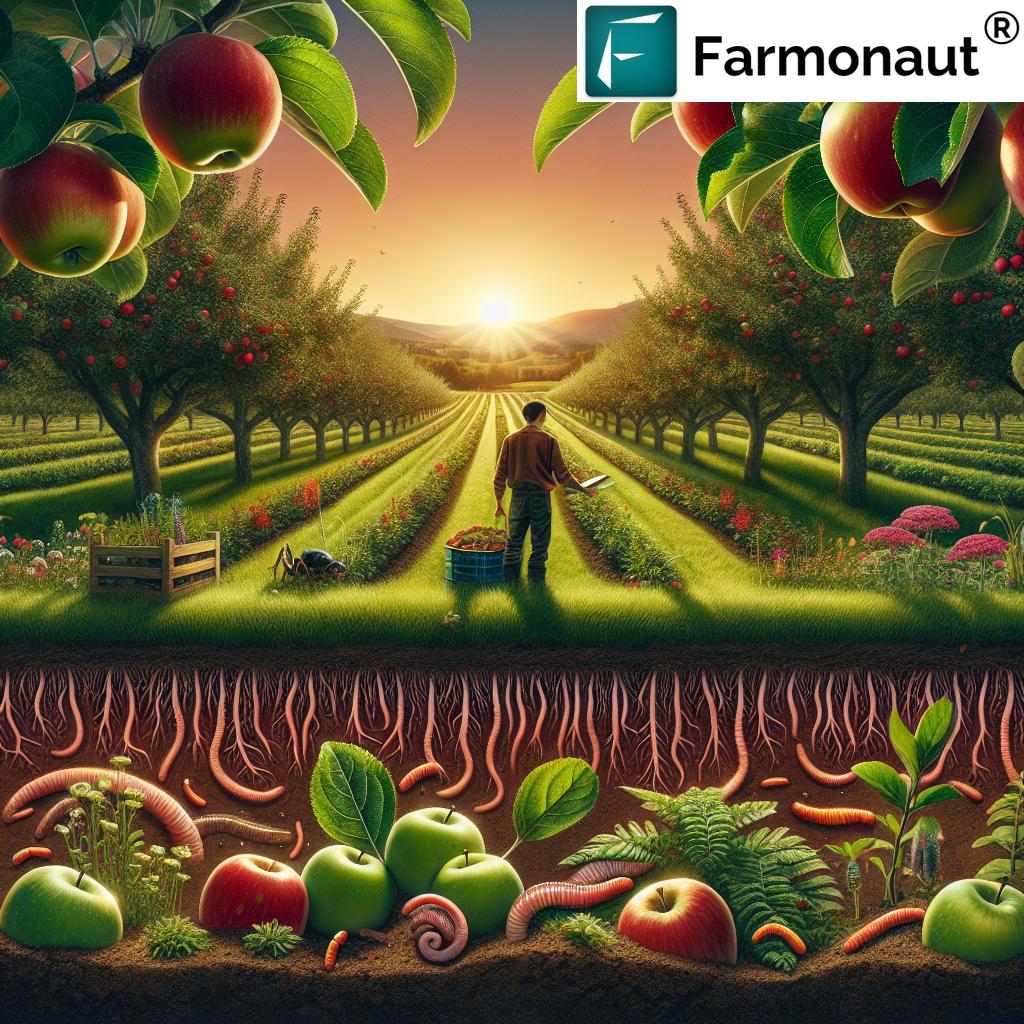Hungary’s Food Waste Revolution: How Sustainable Practices Are Saving Millions and Transforming Households
“Hungary produces 1.8 million tons of food waste annually, with one-third coming from households.”
In recent years, Hungary has emerged as a pioneer in the fight against food waste, implementing innovative programs and sustainable agriculture practices that are transforming households and saving millions. As we delve into this inspiring journey, we’ll explore how the country is tackling the pressing issue of food waste, with a particular focus on reducing household food waste, which accounts for a staggering one-third of the 1.8 million tons produced annually.
The Scale of Food Waste in Hungary
Before we dive into Hungary’s revolutionary approach, let’s understand the magnitude of the problem. Hungary, like many other countries, faces significant challenges when it comes to food waste. The country produces approximately 1.8 million tons of food waste each year, with households contributing to one-third of this amount. This translates to roughly 600,000 tons of food being wasted in Hungarian homes annually.
To put this into perspective, the average Hungarian citizen throws away about 65 kg of food per year. This not only represents a substantial economic loss but also has severe environmental implications. Food waste in landfills produces methane, a potent greenhouse gas that contributes to climate change.

The “Wasteless” Initiative: A Game-Changer in Food Waste Reduction
At the heart of Hungary’s food waste revolution is the “Wasteless” initiative, an ambitious program aimed at raising awareness and promoting food waste prevention strategies. This comprehensive approach targets various sectors of society, with a particular focus on households and educational institutions.
Key Components of the “Wasteless” Initiative:
- Educational Campaigns in Elementary Schools: Recognizing the importance of early education, the initiative has implemented programs in elementary schools to teach children about the value of food and the impact of waste.
- Public Engagement Events: Regular events are organized to engage the public, offering practical tips and demonstrations on reducing food waste at home.
- Awareness Campaigns: Widespread media campaigns help to disseminate information and tips on food waste reduction to a broader audience.
- Stakeholder Collaboration: The initiative brings together various stakeholders, including government agencies, NGOs, and food industry representatives, to create a unified approach to tackling food waste.
By focusing on these key areas, the “Wasteless” initiative is fostering a culture of sustainability and conscious consumption across Hungary.
Understanding the Types of Food Waste
To effectively address food waste, it’s crucial to understand its different forms. In Hungary, food waste is categorized into three main types:
- Avoidable Food Waste: This includes food that could have been consumed if managed better. Examples include expired products, leftovers, and spoiled fruits and vegetables.
- Potentially Avoidable Food Waste: This category covers food items that some people eat and others don’t, such as apple cores, potato skins, or bread crusts.
- Unavoidable Food Waste: This refers to inedible parts of food, such as bones, eggshells, and fruit pits.
By educating the public about these categories, Hungary is helping its citizens make more informed decisions about food consumption and disposal.
Best Practices for Reducing Food Waste at Home
One of the key focuses of Hungary’s food waste reduction efforts is empowering households with practical strategies to minimize waste. Here are some of the best practices promoted through the “Wasteless” initiative:
- Smart Shopping: Plan meals in advance and create shopping lists to avoid overbuying.
- Proper Storage: Learn the optimal storage methods for different types of food to extend their shelf life.
- Creative Cooking: Use leftovers and imperfect produce in soups, stews, or smoothies.
- Portion Control: Serve smaller portions to reduce the amount of uneaten food.
- Composting: Turn unavoidable food waste into nutrient-rich compost for gardens.
These simple yet effective strategies are helping Hungarian households significantly reduce their food waste footprint.
The Economic Impact of Food Waste Reduction
Hungary’s efforts to combat food waste are not just environmentally beneficial; they also have significant economic implications. By reducing food waste, households can save substantial amounts of money on their grocery bills. On a national scale, the reduction in food waste translates to millions of euros saved annually.
Furthermore, the initiatives are creating new opportunities in the circular economy. Businesses are emerging that focus on upcycling food waste into new products, creating jobs and driving innovation in the process.
Sustainable Agriculture Practices in Hungary
While much of the focus has been on reducing household food waste, Hungary is also making strides in promoting sustainable agriculture practices. These efforts aim to reduce waste at the production level and create a more efficient food supply chain.
Key Sustainable Agriculture Initiatives:
- Precision Farming: Utilizing technology to optimize crop yields and reduce resource waste.
- Crop Diversification: Encouraging farmers to grow a variety of crops to improve soil health and reduce the risk of crop failures.
- Organic Farming: Promoting organic farming practices that reduce reliance on chemical inputs and improve soil quality.
- Water Conservation: Implementing efficient irrigation systems to reduce water waste in agriculture.
These sustainable agriculture practices not only reduce waste but also contribute to the overall health of Hungary’s agricultural sector.
“The “Wasteless” initiative in Hungary targets elementary schools and public events to reduce food waste.”
The Role of Technology in Food Waste Reduction
Technology plays a crucial role in Hungary’s food waste reduction efforts. From apps that help consumers track their food inventory to advanced storage solutions that extend food shelf life, innovation is at the forefront of this revolution.
One company that’s making significant strides in this area is Farmonaut. While not directly involved in Hungary’s initiatives, Farmonaut’s technology offers valuable solutions for sustainable agriculture and resource management that align with Hungary’s goals.
Farmonaut’s satellite-based farm management solutions provide farmers with real-time insights into crop health, soil moisture levels, and other critical metrics. This data-driven approach helps optimize crop yields and reduce resource wastage, contributing to more sustainable farming practices.
By leveraging such technologies, farmers can make more informed decisions about resource allocation, potentially reducing food waste at the production level.
Public Awareness and Education Campaigns
A significant part of Hungary’s success in reducing food waste can be attributed to its comprehensive public awareness and education campaigns. These initiatives aim to change consumer behavior and foster a culture of sustainability.
Key Elements of Hungary’s Public Awareness Campaigns:
- School Programs: Interactive lessons and activities in schools to teach children about food waste and its impacts.
- Community Events: Workshops and demonstrations in public spaces to showcase food waste reduction techniques.
- Media Campaigns: Television, radio, and social media campaigns to reach a wide audience with food waste reduction messages.
- Partnerships with Influencers: Collaborations with popular figures to promote sustainable food consumption habits.
These multi-faceted campaigns are crucial in changing public perception and behavior regarding food waste.
The Impact on Hungarian Households
The food waste reduction initiatives in Hungary are having a profound impact on households across the country. Families are reporting significant reductions in their food waste, leading to cost savings and a heightened awareness of sustainable consumption practices.
Benefits for Hungarian Households:
- Cost Savings: Reduced food waste translates to lower grocery bills for families.
- Improved Nutrition: Better meal planning often leads to more balanced and nutritious diets.
- Environmental Awareness: Families are becoming more conscious of their environmental impact.
- Community Engagement: Food waste reduction initiatives are bringing communities together around a common goal.
These positive changes at the household level are crucial for the long-term success of Hungary’s food waste reduction efforts.
Challenges and Future Directions
While Hungary has made significant progress in reducing food waste, challenges remain. Changing long-standing habits and perceptions about food consumption and waste is an ongoing process that requires persistent effort and innovation.
Future Directions for Hungary’s Food Waste Reduction Efforts:
- Expanding Technology Integration: Further incorporating technologies like AI and blockchain to optimize the food supply chain.
- Policy Development: Creating more comprehensive policies to incentivize food waste reduction across all sectors.
- International Collaboration: Sharing best practices with other countries and learning from global initiatives.
- Continuous Education: Developing new and engaging ways to educate the public about food waste reduction.
By addressing these challenges and pursuing these directions, Hungary aims to further reduce its food waste and continue leading by example in sustainable food consumption.

The Role of Technology in Sustainable Agriculture
As Hungary continues its journey towards sustainable food consumption, the role of technology in agriculture becomes increasingly important. Advanced agricultural technologies can help reduce waste at the production level, complementing the efforts to reduce consumer food waste.
Farmonaut’s AI-driven advisory system, Jeevn AI, is an example of how technology can contribute to more sustainable farming practices. By providing real-time insights and personalized recommendations, such systems can help farmers optimize their crop management, potentially reducing waste and improving yields.
Explore Farmonaut’s API for advanced agricultural data
While not directly part of Hungary’s initiatives, such technologies align with the country’s goals of promoting sustainable agriculture and reducing food waste throughout the supply chain.
Comparative Table: Food Waste Reduction Strategies in Hungary
| Sector | Initiative | Estimated Annual Reduction (tons) | Key Benefits |
|---|---|---|---|
| Households | “Wasteless” Program | 100,000 | Increased awareness, cost savings for families |
| Schools | Educational Campaigns | 50,000 | Early education on sustainability, long-term behavior change |
| Restaurants | Portion Control Initiative | 75,000 | Reduced food waste, cost savings for businesses |
| Supermarkets | Food Donation Program | 120,000 | Reduced waste, support for food banks |
| Agriculture | Precision Farming Techniques | 200,000 | Improved crop yields, reduced resource waste |
The Global Context: Hungary’s Role in the EU’s Food Waste Reduction Efforts
Hungary’s food waste reduction initiatives are not happening in isolation. They are part of a broader European Union effort to tackle food waste across the continent. The EU has set ambitious targets to halve per capita food waste at the retail and consumer levels by 2030, and Hungary’s efforts are contributing significantly to this goal.
Hungary’s Contributions to EU Food Waste Reduction:
- Policy Innovation: Hungary’s “Wasteless” initiative serves as a model for other EU countries.
- Data Sharing: Hungary’s research and data on food waste help inform EU-wide strategies.
- Cross-Border Collaboration: Hungary participates in EU-wide projects and knowledge-sharing initiatives on food waste reduction.
By aligning its efforts with EU goals, Hungary is playing a crucial role in the continent-wide push for more sustainable food consumption practices.
The Economic Opportunities in Food Waste Reduction
While the primary focus of Hungary’s food waste reduction efforts is environmental sustainability, these initiatives are also creating significant economic opportunities. The push towards a circular economy in agriculture is opening up new markets and business models.
Economic Benefits of Food Waste Reduction:
- Job Creation: New businesses focused on upcycling food waste are emerging, creating employment opportunities.
- Innovation: The challenge of reducing food waste is driving innovation in food packaging, preservation, and distribution technologies.
- Cost Savings for Businesses: Companies in the food industry are finding ways to reduce costs by minimizing waste.
- New Revenue Streams: Some businesses are finding ways to monetize what was previously considered waste, turning it into valuable by-products.
These economic benefits demonstrate that sustainability and economic growth can go hand in hand, reinforcing the importance of Hungary’s food waste reduction efforts.
Check out Farmonaut’s API Developer Docs for integrating agricultural data into your applications
The Role of Consumer Behavior in Food Waste Reduction
At the heart of Hungary’s food waste revolution is a focus on changing consumer behavior. Recognizing that a significant portion of food waste occurs at the household level, many of the country’s initiatives aim to educate and empower consumers to make more sustainable choices.
Key Aspects of Consumer-Focused Initiatives:
- Education on Food Labels: Helping consumers understand the difference between “best before” and “use by” dates to prevent unnecessary waste.
- Meal Planning Workshops: Teaching consumers how to plan meals effectively to reduce overbuying and waste.
- Food Storage Tips: Providing information on optimal storage methods for different types of food to extend shelf life.
- Leftover Recipe Ideas: Encouraging creative use of leftovers to reduce food waste.
By focusing on these practical, everyday actions, Hungary is empowering its citizens to be active participants in the fight against food waste.
The Future of Food Waste Reduction in Hungary
As Hungary continues to make strides in reducing food waste, the country is looking towards the future with ambitious goals and innovative strategies. The success of current initiatives has set the stage for even more comprehensive approaches to food waste reduction.
Future Directions for Hungary’s Food Waste Reduction Efforts:
- Technological Integration: Further incorporating advanced technologies like AI and IoT in food production and distribution to minimize waste.
- Policy Development: Creating more robust policies and incentives to encourage food waste reduction across all sectors.
- Expansion of Educational Programs: Broadening the reach of educational initiatives to cover all age groups and sectors of society.
- International Collaboration: Sharing best practices with other countries and participating in global food waste reduction efforts.
These future directions demonstrate Hungary’s commitment to continuous improvement and innovation in its fight against food waste.
Conclusion: Hungary’s Food Waste Revolution – A Model for Global Change
Hungary’s comprehensive approach to food waste reduction serves as an inspiring model for countries around the world. By combining innovative programs, sustainable agriculture practices, and a strong focus on public education, Hungary has made significant strides in transforming its food consumption patterns and reducing waste.
The “Wasteless” initiative, along with other targeted programs, has not only raised awareness about the issue of food waste but has also empowered Hungarian citizens to take concrete actions in their daily lives. From elementary school children learning about the value of food to households implementing smart shopping and cooking practices, the impact of these initiatives is visible across all sectors of society.
Moreover, Hungary’s efforts demonstrate that addressing food waste is not just an environmental imperative but also an economic opportunity. The push towards a circular economy in agriculture is creating new jobs, driving innovation, and opening up new markets.
As Hungary continues to refine and expand its food waste reduction strategies, it sets an example for other nations to follow. The country’s success shows that with the right combination of policy, education, and technology, significant reductions in food waste are achievable.
In the global fight against food waste, Hungary’s revolution stands as a beacon of hope and a call to action. It reminds us that every individual, household, and community has a role to play in creating a more sustainable food system. As we look to the future, Hungary’s journey offers valuable lessons and inspiration for a world striving to reduce waste and build a more sustainable future.
FAQs: Hungary’s Food Waste Revolution
- Q: How much food waste does Hungary produce annually?
A: Hungary produces approximately 1.8 million tons of food waste each year. - Q: What percentage of Hungary’s food waste comes from households?
A: Households contribute to about one-third of Hungary’s total food waste, which is roughly 600,000 tons annually. - Q: What is the “Wasteless” initiative?
A: The “Wasteless” initiative is a comprehensive program in Hungary aimed at raising awareness and promoting food waste prevention strategies, particularly focusing on households and educational institutions. - Q: How does Hungary categorize food waste?
A: Hungary categorizes food waste into three types: avoidable, potentially avoidable, and unavoidable food waste. - Q: What are some best practices for reducing food waste at home?
A: Some best practices include smart shopping, proper food storage, creative cooking with leftovers, portion control, and composting. - Q: How is technology contributing to food waste reduction in Hungary?
A: Technology is playing a crucial role through apps for inventory tracking, advanced storage solutions, and precision farming techniques that optimize crop yields and reduce resource waste. - Q: What economic benefits has Hungary seen from its food waste reduction efforts?
A: Economic benefits include cost savings for households and businesses, job creation in the circular economy sector, and new revenue streams from upcycling food waste. - Q: How is Hungary contributing to the EU’s food waste reduction goals?
A: Hungary is contributing through policy innovation, data sharing, and participation in EU-wide projects and knowledge-sharing initiatives on food waste reduction. - Q: What future directions is Hungary considering for its food waste reduction efforts?
A: Future directions include expanding technology integration, developing more comprehensive policies, broadening educational programs, and increasing international collaboration. - Q: How can individuals contribute to Hungary’s food waste reduction efforts?
A: Individuals can contribute by implementing smart shopping practices, properly storing food, using leftovers creatively, composting, and educating themselves and others about food waste reduction.















